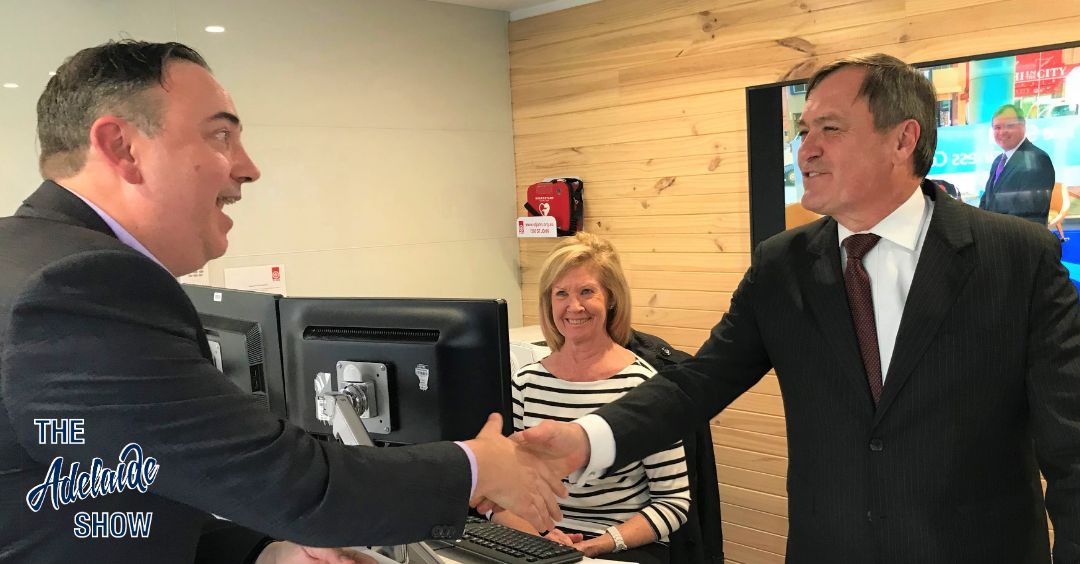In this week’s episode of The Adelaide Show, Steve chats with SA Small Business Commissioner, John Chapman, to get his view of business risks and remedies for South Australian SMBs, as well as share other observations about the business landscape.
This week, the SA Drink Of The Week will add some sparkle, thanks to Peta Baverstock from Cuvee Co.
And in the Musical Pilgrimage, we hear a song by local singer/songwriter, and Riverland Ambassador, Kelly Menhennett.
And please consider becoming part of our podcast by joining our Inner Circle. It’s an email list. Join it and you might get an email on a Sunday or Monday seeking question ideas, guest ideas and requests for other bits of feedback about YOUR podcast, The Adelaide Show. Email us directly and we’ll add you to the list: podcast@theadelaideshow.com.au
If you enjoy the show, please leave us a 5-star review in iTunes or other podcast sites, or buy some great merch from our Red Bubble store – The Adelaide Show Shop. We’d greatly appreciate it.
And please talk about us and share our episodes on social media, it really helps build our community. Oh, and here’s our index of all episode in one concise page
Running Sheet: The SA Small Business Commissioner on risks and remedies for SMBs
| TIME | SEGMENT |
| 00:00:00 | Intro |
|
When is a small business NOT a small business? One of our listeners, Cathy Chua, asked: When people talk about ‘small business’, to me it means one to a few people including owner and staff running something, probably with ingenuity on a shoestring and hoping that Amazon doesn’t do them over. Whereas the definitions used by ATO is one that has annual revenue turnover (excluding GST) of less than $2 million. For employment purposes, Fair Work Australia defines a small business as one that has less than 15 employees. I know that 15 employees doesn’t sound like a lot, but 2M sounds like a huge amount to me. So I’m curious to know what ‘small business’ means in this context? Should you care about the Commission if you’re an employee? |
|
| 00:02:10 | SA Drink Of The Week |
| Ada’s Prosecco from Cuvee Co, Coonawarra. Meet the winemaker, Peta Baverstock as we open the show and announce the SA Drink Of The Week. |
|
| 00:08:10 | John Chapman, SA Small Business Commissioner |
|
In our society, we worship the principle of competition. We have faith that a free market yields the best outcome for everyone. However, as we’ve seen throughout history, when some players achieve unusual dominance or use deception to gain the upper hand, there are casualties. In South Australia, we have a Small Business Commissioner whose role is to ensure competition is taking place in a fair operating environment. It sounds like a wonderful ideal, but something tells me our Commissioner and his team probably get little time for rest. John Chapman, welcome to the formal part of the podcast.
Am I right about your office being busy? Is there a way to quantify the scale of activity you’re involved in? John, I’d like to turn to story that I just found in the paper: John, one of the noble aims of the Office, is that you’ll help resolve disputes “with as little stress as possible to small business operators”. Is that one of those lofty stretch goals that is always just out of reach, or are you able to achieve low stress outcomes regularly? I want to turn back to the notion of creating a fair operating environment. What does a fair environment look like to you? And how does your vision consider actual rule breaking vs uneven balances of power between parties? Capture a broad overview of what the Office can and can’t do, and how people can raise concerns with the Commissioner Let’s look at some of the most common scenarios small businesses find themselves in and reflect on what preventative actions might have reduced the risk: Tenancies and landlords. Are issues here about landlords being non-responsive to maintenance, or hiking up rents, or tenants absconding? Phoenixing. This plagues the building industry but I know through first hand experience that it also happens in business and marketing consulting. It’s where a company liquidates its ABN then magically rises like a phoenix and continues trading with a very similar business name, having just wiped the slate of all its debt. I have heard there are moves to actually give authorities teeth, but there are many people driving around the streets of Adelaide with luxury cars and homes paid for by hapless contractors whom they’ve double crossed. Infrastructure fall out. My heart breaks for many small operators who lose foot traffic due to new hotels being built, or roadworks, etc. Farms get mentioned a bit on your website, especially in relation to debt. What sorts of things do you deal with? Sondra Stewart from the RDA on Eyre Peninsula: We know rural people are resilient mob but there is a need for investment on the ground (Business Development Managers) to assist small business owners to evolve and empower them to grow their businesses and value and embrace collaboration. There is a definite need to build capability within small business as these make up a majority of businesses in regional areas; assistance via the way of training (like Adelaide Business Hub with workshops and mentoring opportunities) for entrepreneurship, diversification in business especially farming, and access to low-cost loans to grow their businesses. When I’m out on the road meeting with Tourism Businesses, and communities I often get asked what grants are available and I feel that we have cultivated a culture of handouts and not building the capability of businesses. There is a real skill shortage in regions which at times hinders business growth, especially in peak seasons like Tourism has, so I feel that their needs to be bigger focus on access to training and education. That’s my 2 cents worth – just some practical assistance on the ground which can lead to some real outcomes which will make a huge difference to regions. Here are some thoughts from Mike Richards and the team at the Polaris Centre at Mawson Lakes: Knowing what you know, would you start a small business in SA today? And, if so, what would you do to avoid needing to ever have to contact the Office of the Small Business Commissioner? I have admired you for voicing bold and forthright positions in public. This is rare for a government-linked body. So, what activities flow after you weigh in on an issue, eg, government reactions, industry bodies, other parties. In other words, what is it like having a public role and taking the opportunity to speak out on important matters (many humans would shrink in fear at that prospect) Does your office observe any toll among business people in relation to mental health? In your days at the Motor Trades Association, you were involved in their group training scheme, opening up apprenticeship pathways, etc. Have we reached a point where trainees at this early level need to be hardened up regarding contracts and business practices? Robyn Lee, CEO of Soniclean: Along with Business SA / Chamber, etc, are there crossovers / double handling? In fact I query these existing structures trying to be the generalist and “relevant to all “. We’re in an age of rebellion to this, such as the 60s / 70s. What measures does an organisation like this have to demonstrate their value? Are those measures contributing towards growth or assisting more mature businesses to grow? Robyn Lee, CEO of Soniclean: I have a very superficial view of the Commission. I am sure they do a great job. As I look outwards to the business environment we’re operating in, I do wonder about people’s / organisations visions and how they see their roles evolving into the future. I would like to know how they keep themselves informed and from which sources. That kind of transparency is quite needed nowadays. And looking at their “industry codes” what about future and emerging industries? Do they have a plan to service and cater for future changes? Nick Leaver from Beyond SA: What are the things on the Commissioner’s agenda that his office will be looking at next? |
|
| 00:50:15 | Musical Pilgrimage |
|
In the musical pilgrimage, we have a track called Lone Tree by Kelly Menhennett.
John, Kelly is an ambassador for the Riverland region. Are regional businesses more exposed to risk, and more isolated from support, than metro businesses? Does that fact that their antagonists might still be living in the same small town, make situations harder?
|
|
Here’s this week’s preview video.
SFX: Throughout the podcast we use free sfx from freesfx.co.uk for the harp, the visa stamp, the silent movie music, the stylus, the radio signal sfx, the wine pouring and cork pulling sfx, and the swooshes around Siri.

